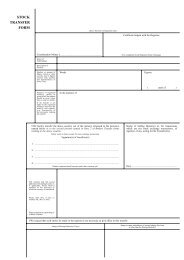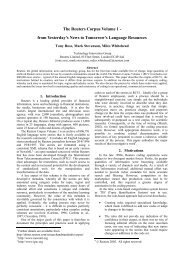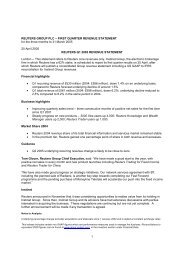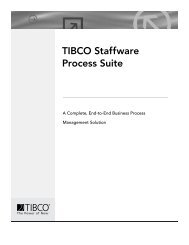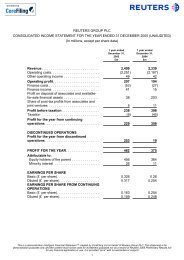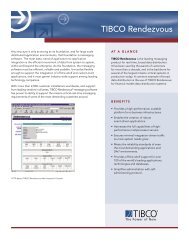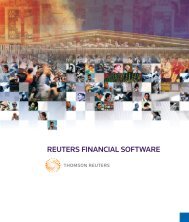Reuters Group PLC Annual Report and Form 20 ... - Thomson Reuters
Reuters Group PLC Annual Report and Form 20 ... - Thomson Reuters
Reuters Group PLC Annual Report and Form 20 ... - Thomson Reuters
- No tags were found...
You also want an ePaper? Increase the reach of your titles
YUMPU automatically turns print PDFs into web optimized ePapers that Google loves.
28 <strong>Reuters</strong> <strong>Group</strong> <strong>PLC</strong> <strong>Annual</strong> <strong>Report</strong> <strong>and</strong> <strong>Form</strong> <strong>20</strong>-F <strong>20</strong>02Operating <strong>and</strong> financial reviewcontinuedUsage revenue (4% or £122 million of total revenue) is principallyderived from BTC <strong>and</strong> Dealing products where revenue is generatedbased on trading volumes. Usage revenue increased by 32% in <strong>20</strong>02compared to a 56% increase in <strong>20</strong>01, attributable to the full yearimpact of BTC.Revenue by customer segmentTreasury ServicesThe Treasury Services segment performed well against a challengingbackdrop of market consolidation <strong>and</strong> cost cutting. Revenue was£1,134 million, down 5% compared to 8% growth in the previousyear. On an underlying basis the decline was 3% – an underlying 7%decline in Dealing revenues was partially offset by strong dem<strong>and</strong> for3000 Xtra <strong>and</strong> other information products <strong>and</strong> by a pick-up in forwardsmatching volumes, particularly in the fourth quarter.Recurring revenues within this segment experienced a modest decline,in tough market conditions, of 4% to £1,000 million, compared togrowth of 7% in the prior year. Information product revenue has grown,principally through 100% growth in 3000 Xtra reflecting a mix of newsales <strong>and</strong> upgrades from the <strong>20</strong>00/3000 product series.Offsetting this growth was a 9% decline in revenue from Dealingproducts to £278 million (<strong>20</strong>01: 8% decline) from both Dealing 3000<strong>and</strong> Dealing <strong>20</strong>00-1. The largest declines were in the UK <strong>and</strong> the US,the former due to various mergers (for example, Halifax <strong>and</strong> Bank ofScotl<strong>and</strong>) <strong>and</strong> the latter due partly to merger activity but also as aresult of the full year impact of the events of 11 September <strong>20</strong>01.Outright revenue declined by 18% to £80 million compared to <strong>20</strong>%growth in <strong>20</strong>01 reflecting the constraints on major IT projects by clients.The consulting practices saw a decline as a result, although this wassomewhat offset by an increase of almost a third in Commodities &Energy outright revenue, driven principally by two major deals in Japan.Usage revenue grew by 4% to £54 million (<strong>20</strong>01: 4% growth), drivenby increased activity on the Dealing Matching systems.Investment Banking (IB)Revenue increased 2% to £834 million due to the acquisition of Bridge,compared to 16% growth in <strong>20</strong>01, but fell 11% on an underlying basis,as customers continued to cut costs by eliminating duplicate services,replacing existing products with lower cost alternatives <strong>and</strong> reducingheadcount.Asset Management (AM)Although the AM segment has not seen the same level of cost-cuttingas other parts of the financial services sector, there has been somelevel of retrenchment <strong>and</strong> consolidation in the industry. Revenue forthe year grew 3% to £709 million (<strong>20</strong>01: 6%) benefiting from theBridge acquisition, but was down 4% on an underlying basis. Recurringrevenues grew by 4% overall (<strong>20</strong>01: 8%) <strong>and</strong> fell just 2% to £674million on an underlying basis as dem<strong>and</strong> for private client services,end-of-day pricing services <strong>and</strong> funds information partially offset theimpact of cancellations due to headcount reductions.Outright revenues declined by 24% to £32 million (<strong>20</strong>01: <strong>20</strong>% decline)as asset managers cancelled or deferred IT expenditure plans or madegreater use of their internal departments for development. AM’sconsulting practices have also suffered from aggressive price competition.Corporates & Media (C&M)Revenues from C&M declined 7% (<strong>20</strong>01: 1% growth) on an underlyingbasis to £315 million. This was due to the impact on our traditionalmedia customers of the downturn in advertising, the fall-out amongour new media customers of the decline in online advertising <strong>and</strong> thereduced dem<strong>and</strong> for research <strong>and</strong> advisory products within thefinancial services <strong>and</strong> IT sectors. Corporates were affected by thegeneral downturn in the economy particularly subsequent to theevents of 11 September <strong>20</strong>01 as well as current political uncertainty.Recurring revenue declined by 7% to £307 million (<strong>20</strong>01: 2% decline)as corporate customers sought to trim costs <strong>and</strong>, as a result, held backor reduced installations of <strong>Reuters</strong> products. Clients also cut back quiteseverely on their research requirements, thus impacting our researchfocusedsubsidiaries Yankee <strong>and</strong> Tower.Operating costsOperating costs for <strong>Reuters</strong> as a whole were reduced by 5% in <strong>20</strong>02,compared to an increase of 11% in <strong>20</strong>01. The underlying costreduction in <strong>20</strong>02 was 10%, compared to a 6% decline in underlyingrevenues. The principal drivers of this reduction were the businesstransformation programme initiated in <strong>20</strong>00 <strong>and</strong> follow on savingsinitiatives. <strong>Annual</strong> savings from these totalled £235 million in <strong>20</strong>02,£30 million more than originally planned. <strong>Reuters</strong> manages costs bygeographic sales <strong>and</strong> service channels <strong>and</strong> centres of excellence.Recurring revenue grew by 1% to £726 million (<strong>20</strong>01: 12%) reflectingthe inclusion of Bridge information revenue (principally BridgeStation,a premium product). On an underlying basis, recurring revenue wasdown 9% as cancellations of legacy products, particularly in Europe,were only partly offset by increased revenues from 3000 Xtra. IB’sbusiness has suffered from client headcount reductions (some 10,500staff cut in the second half of <strong>20</strong>02 at the six largest investmentbanks) <strong>and</strong> the intensive competitive actions (price-cutting <strong>and</strong>launch of products).Partly offsetting the decline has been growth in Enterprise InformationProducts <strong>and</strong> the newly launched North American Capital Marketsproduct (NACAP).Outright revenues fell 32%, compared to 29% growth in <strong>20</strong>01, asbanks remain reluctant to commit to new IT projects.Usage revenue grew 140% to £59 million aided by a full year of strongtrading performance from BTC. Excluding BTC, there was growth of11% driven by the <strong>Reuters</strong> InterTrade Direct product.



